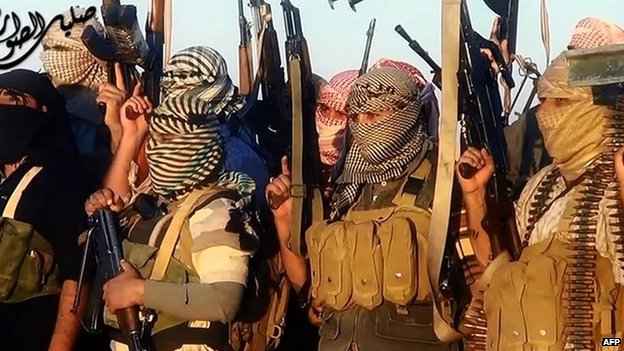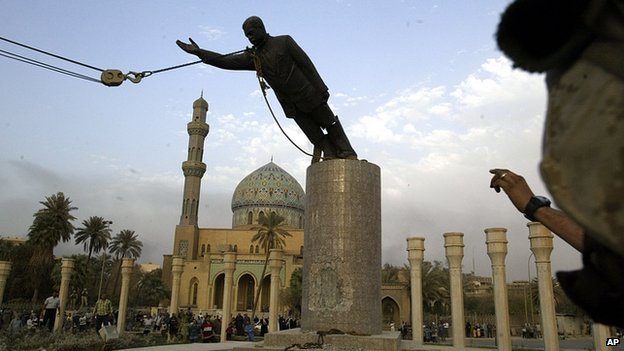JUNE 11, 2014
IN EXTREMISTS’ IRAQ RISE,
AMERICA’S LEGACY

First Falluja, then Mosul, and now the oil-refinery town of Bayji. The rapid advance of Al Qaeda-inspired militants across the Sunni heartland of northern and western Iraq has been stunning and relentless—and utterly predictable. Here’s a forecast: the bad news is just beginning.
The capture of Mosul, Iraq’s second-largest city, by Sunni extremists on Tuesday is the most dramatic example of the resurgence of the country’s sectarian war, which began almost immediately after the withdrawal of the last American forces in December, 2011. The fighters who took Mosul are attached to an Al Qaeda spawn called the Islamic State of Iraq and al-Sham, or ISIS, which is now poised to carve out a rump state across the Sunni-dominated lands that stretch from western Baghdad to the Syrian border and beyond.
As I detailed in a recent piece for the magazine, Iraq’s collapse has been driven by three things. The first is the war in Syria, which has become, in its fourth bloody year, almost entirely sectarian, with the country’s majority-Sunni opposition hijacked by extremists from groups like ISIS and Jabhat al-Nusra, and by the more than seven thousand foreigners, many of them from the West, who have joined their ranks. The border between the two countries—three hundred miles long, most of it an empty stretch of desert—has been effectively erased, with ISIS and Nusra working both sides. As the moderates in Syria have been pushed aside, so too have their comrades in Iraq.
The second factor—probably the dominant one—is the policies of Nuri Al-Maliki, Iraq’s Prime Minister. Maliki is a militant sectarian to the core, and he had been fighting on behalf of Iraq’s long-suppressed Shiite majority for years before the Americans arrived, in 2003. Even after the Americans toppled Saddam, Maliki never stopped, taking a page—and aid and direction—from his ideological brethren across the border in Iran. When the Americans were on the ground in Iraq, they acted repeatedly to restrain Maliki, and the rest of Iraq’s Shiite leadership, from its most sectarian impulses. At first, they failed, and the civil war began in earnest in 2006. It took three years and hundreds of lives, but the American military succeeded in tamping down Iraq’s sectarian furies, not just with violence but also by forcing Maliki to accommodate Sunni demands. Time and again, American commanders have told me, they stepped in front of Maliki to stop him from acting brutally and arbitrarily toward Iraq’s Sunni minority. Then the Americans left, removing the last restraints on Maliki’s sectarian and authoritarian tendencies.
In the two and a half years since the Americans’ departure, Maliki has centralized power within his own circle, cut the Sunnis out of political power, and unleashed a wave of arrests and repression. Maliki’s march to authoritarian rule has fueled the reëmergence of the Sunni insurgency directly. With nowhere else to go, Iraq’s Sunnis are turning, once again, to the extremists to protect them.
Which brings us to the third reason. When the Americans invaded, in March, 2003, they destroyed the Iraqi state—its military, its bureaucracy, its police force, and most everything else that might hold a country together. They spent the next nine years trying to build a state to replace the one they crushed. By 2011, by any reasonable measure, the Americans had made a lot of headway but were not finished with the job. For many months, the Obama and Maliki governments talked about keeping a residual force of American troops in Iraq, who would act largely to train Iraq’s Army and to provide intelligence against Sunni insurgents. (They would almost certainly have been barred from fighting.) Those were important reasons to stay, but the most important went largely unstated: it was to continue to act as a restraint on Maliki’s sectarian impulses, at least until the Iraqi political system was strong enough to contain him on its own. The negotiations between Obama and Maliki fell apart, in no small measure because of a lack of engagement by the White House. Today, many Iraqis, including some close to Maliki, say that a small force of American soldiers—working in non-combat roles—would have provided a crucial stabilizing factor that is now missing from Iraq. Sami al-Askari, a Maliki confidant, told me for my article this spring, “If you had a few hundred here, not even a few thousand, they would be coöperating with you, and they would become your partners.” President Obama wanted the Americans to come home, and Maliki didn’t particularly want them to stay.
The trouble is, as the events of this week show, what the Americans left behind was an Iraqi state that was not able to stand on its own. What we built is now coming apart. This is the real legacy of America’s war in Iraq.
Thousands of Iraqis flee Mosul as militants attack. Photograph by Emrah Yorulmaz/Anadolu Agency/Getty.
__________________________
![]()
11 June 2014
UN condemns Iraqi militant attacks
 By Jonathan MarcusBBC diplomatic correspondent
By Jonathan MarcusBBC diplomatic correspondent
The borders of the modern Middle East are in large part a legacy of World War One. They were established by the colonial powers after the defeat and dismemberment of the Ottoman Empire.
Those borders could now be in peril for two main reasons – the continuing fighting and fragmentation of Syria and the ISIS assault in Iraq Unless the military gains of ISIS can be reversed, the Iraqi state is in peril as never before. The dual crises in Syria and Iraq combine to offer the possibility of a “state” encompassing eastern Syria and western Iraq where the jihadists of ISIS hold sway.
This would have huge implications for the region and beyond. Iraq has to a large extent staggered from crisis to crisis, so what went wrong?
‘Original sin’
For some, Iraq’s problems begin at the creation, with the founding of the modern Iraqi state itself. Britain, as the colonial power, established a Hashemite kingdom that took little account of other communities like the Shia or the Kurds – a theme that was to recur throughout Iraq’s turbulent history.
The monarchy was eventually overturned by a Baathist coup similar to the secular, nationalist and modernising forces that propelled the Nasser regime to power in Egypt.
It is this edifice that was eventually headed by Saddam Hussein whose Sunni-dominated regime dealt harshly with Shia and Kurdish sentiment.
Western support for Saddam during the Iran-Iraq War only seemed to consolidate his brutal regime.
Operation Iraqi Freedom
The Baathist state was destroyed by the US and British invasion of Iraq in 2003. Saddam Hussein was deposed and ultimately tried and executed by the new Iraqi government. Iraq’s military was largely dismantled and a new security force created.
The war which some US neoconservatives saw as an explicit attempt to bring democracy to the region, established new political arrangements, which while seeking to unite all communities, effectively produced a state dominated by the Shia majority.
Many had actually wondered if Iraq could actually hold together as a unitary state, not least because the Kurds in the north had been able to carve out a significant degree of autonomy for themselves.
US pull-out
Despite initial plans to keep some forces in Iraq to assist the local army, no agreement could be reached between Baghdad and Washington, and the last US troops pulled out in December 2011 leaving security in the hands of the often less-than-effective Iraqi military.
The US had chalked up some significant successes in courting Sunni groups to help fight al-Qaeda-linked jihadist terrorism. Without the Americans these arrangements quickly broke down.
Sunnis found themselves increasingly the victims of the Shia-dominated government’s security forces.
Indeed, the heavy-handedness of Iraqi forces may have effectively acted as a “recruiting sergeant” for ISIS.
Sectarianism in the new Iraq
The great paradox of the US overthrow of Saddam Hussein is that by destroying Iraq as a regional player they accelerated and facilitated the rise of Iran. Tehran saw the Shia in Iraq as its allies in a wider regional struggle.
Maybe emboldened by support from Iran, Prime Minister Nouri Maliki’s Shia triumphalism antagonised many Sunnis worsening the security situation on the ground.
Economic and social failure
Sectarianism and the Sunni-Shia divide is seen by many commentators in a kind of chicken and egg situation.
Is it the sectarian differences in themselves that are the problem or is it that the Iraqi state’s social and economic failure prompted more bitter divisions?
Iraqis – despite their country’s oil wealth – are generally poor and levels of corruption in the country are very high.
Regional context
Nothing that happens in the Middle east occurs in a vacuum. Iraqis, while fixated inevitably on their own problems, have watched as the currents of the Arab Spring have come and gone; the almost circular political transformation in Egypt; and of course crucially the upheavals in neighbouring Syria. The jihadist surge there has inevitably had implications across the border in Iraq.
Backing for extreme Sunni fighters from the Gulf States has also facilitated the emergence and consolidation of groups like ISIS with a broader regional agenda.
And while direct collusion between the Syria’s Assad regime and the jihadists is hard to prove, there have been consistent reports that the Damascus government’s military has paid far less attention to such groups while concentrating its fire on more moderate Western-backed fighters. This has given ISIS room to establish its own administrative structures in the areas it controls.
>via: http://www.bbc.com/news/world-middle-east-27802746



